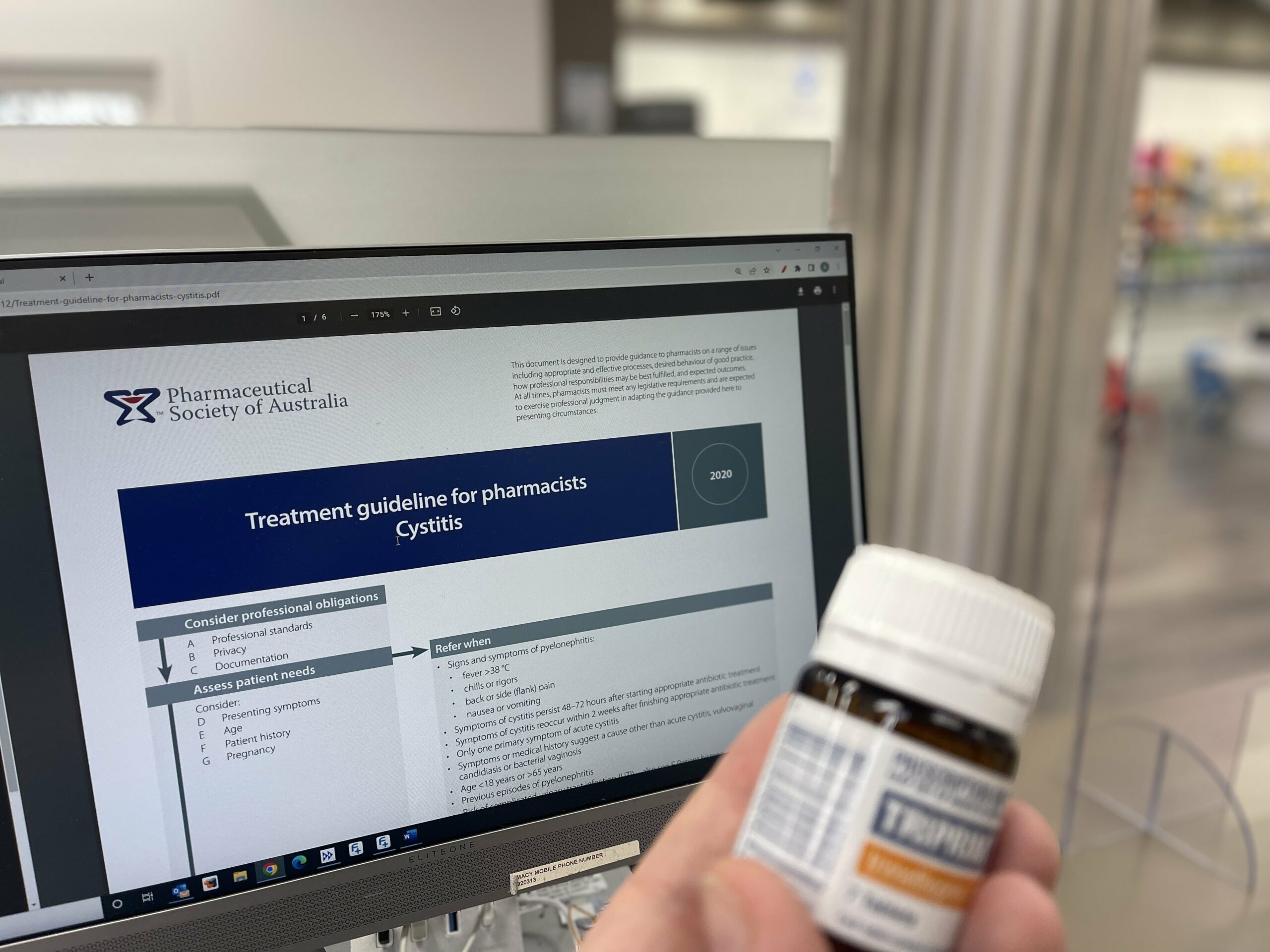Promised for many years, the full realisation of pharmacists practising to top of scope is happening right now.
Not since compounding of medicines was largely overtaken by ‘ready-made’ products nearly a century ago has pharmacist practice undergone such rapid and fundamental change as in the last few years.
Propelled by the COVID-19 pandemic, the pace of change recently has been staggering. In a revolutionary sweep across previously unremunerated territory, pharmacists in northern Queensland and New South Wales will soon be paid for the consultation to prescribe some medicines.
And vaccination is paving the way for pharmacists to be remunerated for administering a whole new range of medicines. It is part of what is shaping up as the next full evolution of pharmacist practice, which may yet mirror the complete transition from apothecaries to compounders and beyond.
And more than likely to come is further recognition, if not yet remuneration, for consultation-led (rather than medicine-led) pharmacist practice via general practice collaborations, Medicare reform, partnerships with Primary Health Networks and prescribing and deprescribing roles in on-site positions in aged care facilities.
Why is expanding scope of practice so important?
Australia is in the grip of a general practice access crisis, driven by entrenched funding and workforce challenges.
‘The pipeline for general practice is broken,’ says PSA National Vice President Dr Shane Jackson FPS, who cites that only 15.2% of current medical graduates are entering the field.1
‘Every day, I see patients who, for one reason or another, are unable to get their medicines for chronic disease in a timely way,’ says Dr Jackson.
And it has never been harder, or more expensive, to see a GP, Federal Minister for Health and Aged Care Mark Butler agrees.
‘Bulk billing rates are in decline and gap fees are constantly going up, impacting the ability of people to get the care they need, when they need it,’ he tells Australian Pharmacist.
In a quest to overhaul Medicare, the Albanese Government’s Strengthening Medicare Taskforce has recommended a variety of options tailored to the needs – and drawing on the strengths – of local communities.
A key element is allowing healthcare professionals, including pharmacists, to work to top of scope. ‘All Australia’s healthcare professionals should be using the full extent of their skills, training and experience,’ says Mr Butler.
Now, state and territory governments – which regulate the prescribing and access controls of medicines – are starting to follow this notion, with unprecedented changes to pharmacy scope of practice expanding nationwide.
What is scope of practice?
Professor Lisa Nissen FPS is the HERA Program Director – Health Workforce Optimisation at the University of Queensland’s Centre for the Business and Economics of Health and Lead of the pioneering UTIPP-Q that has resulted in more such trials this year and extended scope for pharmacist prescribing.
The concept of “scope of practice”, she says, is already captured in the National Competency Standards Framework for Pharmacists (2016) – ‘time sensitive, dynamic aspect of practice which indicates those professional activities that a pharmacist is educated, competent and authorised to perform, and for which they are accountable’.
This tells us, she says, that scope of practice:
- By nature of the core elements of competency and accountability, is something every individual has – but will be potentially different for each of us within the broad scope of pharmacy.
- Can be developed and may change over time – both as a collective professional group and individually.
- Can be developed and moved through education (skills and knowledge) and the resultant competency.
- Regarding an individual, will likely flex and change over a pharmacist’s professional practice career.
The “scope of practice” for the profession is based on professional competencies NCSF (Skills, knowledge and behaviours expected of pharmacists), which is attained primarily through graduation from a pharmacy degree and registration with the Pharmacy Board of Australia (all aligned to these agreed core competencies).
‘We maintain this through life-long learning and our CPD,’ says Prof Nissen. ‘The resultant professional legislative authorities to dispense, supply, vaccinate and other practices etc, are all then aligned to the accountability we have as pharmacists to these competencies (and other professional practice standards and guidelines) that registration as a pharmacist provides.
‘Vaccination is now part of the “scope of practice” for pharmacists as a profession. There is no doubt it has been an activity that has added greatly to our contribution to the health sector, particularly during COVID-19. However, it is important to note that vaccination is also an example of how scope of practice is individual,’ says Prof Nissen.
‘Not all pharmacists can or want to vaccinate, even if they were trained at university. And that is ok. Not everyone has to be doing everything.’
So where are the biggest changes already happening?
Prescribing
Pharmacists have always prescribed. This includes non-prescription medicines, emergency supply of prescription medicines and more recently vaccines.
Using the skills and knowledge of prescribing for more medicines is a logical way to help address some of the access challenges.
For presentations of acute conditions and minor illness, Dr Jackson says pharmacists have engaged in triage and referral for decades.
‘This is nothing new. What has been talked about in terms of increased scope of practice, however, is access to medicines, which is best practice.’
So where is this expansion of prescribing happening?
Urinary tract infections
The 2-year Urinary Tract Infection Pharmacy Pilot – Queensland (UTIPP–Q) was rolled out state-wide and permanently in October 2022.3 NSW, Victoria,4 ACT and Tasmania have all announced similar trials to commence in 2023.
Access to treatment for uncomplicated cystitis in women is valuable as it is one of the top causes of avoidable hospital presentations. It is able to treated empirically based on symptoms, and the treatment options are relatively cheap; making it an effective access intervention.
And the results from Queensland were clear – pharmacists who participated were appropriately trained, adhered to standards and guidance – and most importantly, provided treatment which successfully resolved symptoms safely in hundreds of women.⁵
Chronic disease treatment
The North Queensland Pharmacy Scope of Practice Pilot,6 anticipated to roll out across 37 local government areas in June 2023, could be the game changer.
Under that pilot, pharmacists will prescribe medicines for a range of acute and minor conditions, such as nausea and vomiting, and minor wound management.
Pharmacists will also be able to prescribe ongoing medicines as part of chronic disease management plans, including cardiovascular disease and asthma through funded consultations. They will range in cost from $20–$55, depending on duration.7
‘This pilot program will mean better access to the primary healthcare services many patients currently find difficult to access,’ says Queensland Minister for Health Yvette D’Ath.
Oral contraception
A NSW prescribing pilot commencing on 1 July 2023 will involve the continuance of prescriptions for the re-supply of certain oral contraceptive pills (OCP).
Patients can access these services free of charge for the 12-month pilot duration, with pharmacists paid a $20 consultation fee by the state government.
‘The NSW Government has heard loud and clear that the process of getting a script for things like a UTI or birth control must be made easier,’ says Minister for Women, Regional Health and Mental Health Bronnie Taylor.
‘This reform delivers on that as well as eases the burden on our GPs.’8
Governments in Victoria and Tasmania have made commitments to provide similar access options.
Returning to full Continued Dispensing
To reduce the burden on the healthcare system, Tasmanian Premier Jeremy Rockliff announced the return of nearly all Prescription Only Medicines to continued dispensing from 6 March 2023.9 However, this only addresses the legality of supply, not the medicine cost.
On a federal level, PSA continues to advocate for full PBS Continued Dispensing to be reinstated. This is so patients have timely access to health care in the event of an emergency.10
Hospital practice
Supplementary prescribing is now widespread in hospitals across Australia – particularly in areas of dose adjustment, medicine reconciliation and therapeutic substitution. (See AP November 2022.)
Table 1 – Expanding scope of practice in 2023
| PRESCRIBING INITIATIVES – UTI | PRESCRIBING INITIATIVES – OTHER | PRESCRIBE AND ADMINISTER VACCINES | |
| ACT | Will join NSW pilot from 1 April 2023 (5 pharmacies) | – | 5 additional vaccines, including travel vaccines from 17 March 2023 |
| NSW | 12-month pilot from 1 April 2023 | Oral contraceptive pill from 1 July 2023 Statewide pharmacist prescribing pilot announced Nov 2022 | Travel vaccines from Nov 2022 |
| NT | – | – | – |
| QLD | UTI pharmacy pilot made permanent | North Queensland Scope of Practice Pilot | Minimum age influenza vaccine removed |
| SA | Parliamentary Committee to examine UTI prescribing | – | – |
| TAS | Full continued dispensing restored from 6 March 2023 | Reduced minimum age for influenza vaccine to 5 years | |
| VIC | 12-month UTI pilot commitment announced Nov 2022 | Oral contraceptive pill renewal | Travel vaccine commitment announced Nov 2022 |
| WA | – | – | – |
Administration of medicines
Expanding vaccine formularies
With ongoing GP access shortages, more Australians engaging in post-COVID-19 international travel11 and new disease patterns following extreme weather events,12 the scope of pharmacist-initiated vaccination is widening.
Pharmacists in NSW13 and ACT14 can now administer six additional vaccines (see Practice feature, p60). Victoria is expected to add a range of travel vaccines to pharmacists’ formulary later this year.
While some vaccines are available through the National Immunisation Program (NIP), patients are still required to pay administration fees.13
‘When that barrier is taken away, we expect to see a far bigger uptake in pharmacies,’ says PSA NSW State Manager Amanda Fairjones MPS.
Custom vaccine formularies
In general practice, pharmacists in WA can administer any vaccine in line with the Medical Practitioner SASA, which has an expanded scope in comparison to the pharmacist SASA – provided it’s in line with their scope of practice and is covered by their professional indemnity insurance, says PSA State Manager Mayli Foong MPS.16
Expanding vaccine access to new populations
Following significant advocacy from PSA, Queensland is the first state to allow community pharmacists to vaccinate patients aged 6 months and older against influenza following an update to the Extended Practice Authority – Pharmacists Version 3 in March 2023.17
‘We will be pushing for further NIP-funded vaccines to be added prior to 2024 to be administered to patients from all age groups,’ says PSA Queensland State Manager Nicole Floyd MPS.
After a targeted consultation in early March to update SA’s vaccine administration code, the PSA has recommended that pharmacists be able to administer a host of vaccines for more vaccine-preventable diseases.
Already, ‘people really appreciate being able to get a JE vaccine at their local pharmacy,’18 says PSA SA/NT State Manager Helen Stone MPS following a successful rollout of the JE vaccine to patients who live, work or travel to the Riverlands area.
However, inconsistencies across practice settings in SA are impeding access to certain vaccines, particularly due to GP workforce shortages.
‘Pharmacists who work in aged care, for example, can’t administer vaccines to patients unless it’s part of an approved community pharmacy program. GPs often ask pharmacists to participate in school vaccination programs. However, if they’re employed by the GP clinic running the program, they can’t vaccinate unless the clinic is an approved organisation through the Communicable Disease Control Branch,’ Ms Stone warns.
Expanding range of medicines pharmacists can administer
Up north, pharmacists in the Northern Territory will soon be able to administer more Schedule 4 or Schedule 8 medicines after Parliament passed the Medicines, Poisons and Therapeutic Goods Legislation Amendment Bill, allowing timely access to medicines based on clinical need.
Updated in early 2023, the legislation features a change to scheduled substance treatment protocols, meaning prescribers can authorise other health professionals to administer these medicines. This could be useful for the administration of long-acting buprenorphine in remote communities, for example.19
In a similar vein, state-wide guidelines for Tasmanian pharmacists to administer injectable buprenorphine, along with PSA training for pharmacists, have also recently been finalised.
Other services
Pharmacists have demonstrated consistently the skills, knowledge and accountability in administering point-ofcare (POC) tests to patients.
Whether in general practice or community pharmacy, pharmacists have offered POC testing including blood glucose, International Normalised Ratio and blood pressure. But when it comes to pharmacist-initiated pathology tests however, a barrier around access to funding persists, says Chris Campbell, General Manager Policy and Program Delivery at PSA. ‘Pharmacists can initiate pathology requests for patients,’ he says.
‘However, general practice is deeply linked to pathology requests, funding and visibility of results, so changes to Medicare and timely access to results through pharmacists will need to occur.’
Quality, safety and support
As scope of practice continues to evolve, PSA is there supporting pharmacists to extend their competence, navigate their authority and be accountable for their evolving role.
This includes the Professional Practice Standards (PPS), which describe minimum standards of practice. To support evolving roles and reflect emerging practice, the next version is under development and will be launched on Friday 28 July at PSA23.
The PSA also provides education for any continued professional development in terms of scope of practice, with standards, guidelines and training for each new service, including Treatment guideline for pharmacists: Cystitis,20 the Managing uncomplicated cystitis21 training module, and the Immunisation Online Refresher Course.22
With the increased workload that comes with practising to top of scope, however, pharmacists should also be appropriately remunerated for their work, says PSA National President Dr Fei Sim.
‘In our 2023–24 Budget Submission, PSA made recommendations to the Federal Government to introduce MBS service payments for pharmacists to claim for consultations, vaccinations, or multidisciplinary case conferencing,’ she says. ‘There’s a lot of work still to be done to support pharmacists practising to top of scope, and PSA will be working closely with stakeholders within and external to our profession.’ Prof Nissen feels it is ‘critically important’ for people in the profession to look beyond themselves, their scopes and practices, and think how important it is for patients and the system for there to be an option for pharmacists to be everywhere there is a medicine.
‘That will require the profession to support the “scope of practice” for pharmacists to encompass not only current but future options and opportunities around medicines management.
‘As individuals, then we will all play a part in how our practice and scope will contribute to the profession overall.’
References
- Medical Deans Australia and New Zealand. Medical Schools Outcomes Database: National Data Report 2020. Sydney: Medical Deans, 2020.
- Pharmaceutical Society of Australia. Guidelines for pharmacists administering medicines by injection. 2020. At: https://my.psa.org.au/servlet/fileField?entityId=ka10o000000QN7DAAW&field=PDF_File_Member_Content__Body__s
- Queensland Government, The Queensland Cabinet and Ministerial Directory. 2022. At: https://statements.qld.gov.au/statements/95679
- Australian Pharmacist. Pharmacy services have expanded in parts of QLD, but what does this mean for you? 2022. At: www.australianpharmacist.com.au/pharmacy-services-expanded-qld-mean-for-you/
- The Conversation. Should pharmacists be able to prescribe common medicines like antibiotics for UTIs? We asked 5 experts. 2022. At: https://theconversation.com/should-pharmacists-be-able-to-prescribe-common-medicines-like-antibiotics-for-utis-we-asked-5-experts-195277
- North Queensland Community Pharmacy Scope of Practice Pilot, October 2022. At: health.qld.gov.au/__data/assets/pdf_file/0029/1166429/Pilot_Services.pdf
- North Queensland pilot program to deliver more effective primary health care. October 2022: At: statements.qld.gov.au/statements/96318
- Stateside pilot for appropriately trained community pharmacists to prescribe medications. NSW Health. March 2023. At: www.health.nsw.gov.au/pharmaceutical/Pages/community-pharmacy-pilot.aspx
- Access to medications making Tasmanian lives easier. 2023: At: www.premier.tas.gov.au/site_resources_2015/additional_releases/access-to-medications-making-tasmanian-lives-easier
- PSA 2023-24 Federal Budget Submission. January 23. At: psa.org.au/advocacy/budget-submissions/
- Australian Bureau of Statistics, Tourism and transport. February 2023. At:
abs.gov.au/statistics/industry/tourism-and-transport - B. Nogrady. Australian floods lead to spread of mosquito-borne diseases. The Lancet. June 2022. At: thelancet.com/journals/laninf/article/PIIS1473-3099(22)00301-2/fulltext
- NSW Health. Expansion of pharmacist vaccination program 2022. 2022. At: www.health.nsw.gov.au/travel/Pages/pharmacist-vax-guide.aspx
- Pharmacy reforms making it easier for Canberrans to access health care. ACT government. March 2023. At: www.cmtedd.act.gov.au/open_government/inform/act_government_media_releases/rachel-stephen-smith-mla-media-releases/2023/pharmacy-reforms-making-it-easier-for-canberrans-to-access-health-care
- Croakey Health Media. On pharmacist prescribing, what do health consumers think? 2023. At: www.croakey.org/on-pharmacist-prescribing-what-do-health-consumers-think/
- Structured Administration and Supply Arrangements. Western Australia Department of Health. At: health.wa.gov.au/Articles/S_T/Structured-Administration-and-Supply-Arrangements
- Medicines and Poisons Act 2019. Extended Practice Authority ‘Pharmacists’. Queensland Government. 2023. At: https://documents.parliament.qld.gov.au/tp/2023/5723T227-4DE3.pdf
- SA Pharmacists to deliver Japanese encephalitis virus vaccines. The Pharmaceutical Society of Australia. October 2022. At: https://www.psa.org.au/sa-pharmacists-to-deliver-japanese-encephalitis-virus-vaccines/
- The domino effect: making sense of upcoming practice changes. Australian Pharmacist: November 2022. At: australianpharmacist.com.au/making-sense-upcoming-practice-changes/#new-south-wales-practice-changes
- Treatment guideline for pharmacists: Cystitis. Pharmaceutical Society of Australia. At: my.psa.org.au/s/article/Treatment-guideline-for-pharmacists-cystitis
- Managing uncomplicated cystitis. Pharmaceutical Society of Australia. At: my.psa.org.au/s/training-plan/a110o00000JPST0AAP/managing-uncomplicated-cystitis
- Immunisation Online Refresher Course. Pharmaceutical Society of Australia. At: my.psa.org.au/s/training-plan/a110o00000AiR6LAAV/immunisation-online-refresher-course



 Professor Margie Danchin[/caption]
Professor Margie Danchin[/caption]

 Dr Peter Tenni[/caption]
Dr Peter Tenni[/caption]
 How should we deprescribe gabapentinoids, according to the Maudsley Deprescribing Guidelines[/caption]
How should we deprescribe gabapentinoids, according to the Maudsley Deprescribing Guidelines[/caption]



 Pharmacists have always prescribed, but they have the potential to prescribe much more
Pharmacists have always prescribed, but they have the potential to prescribe much more






